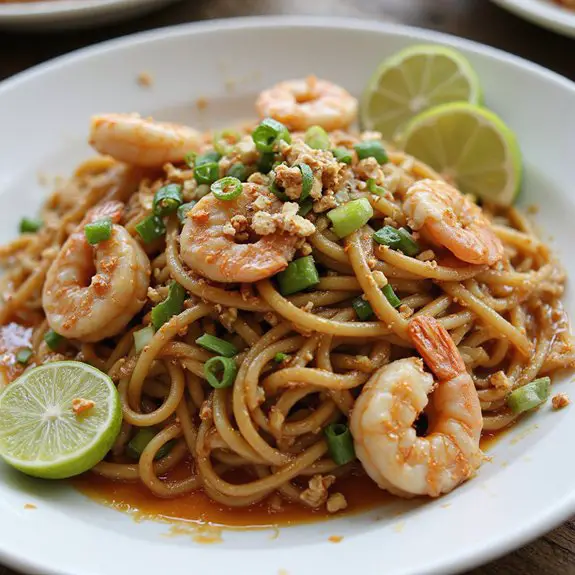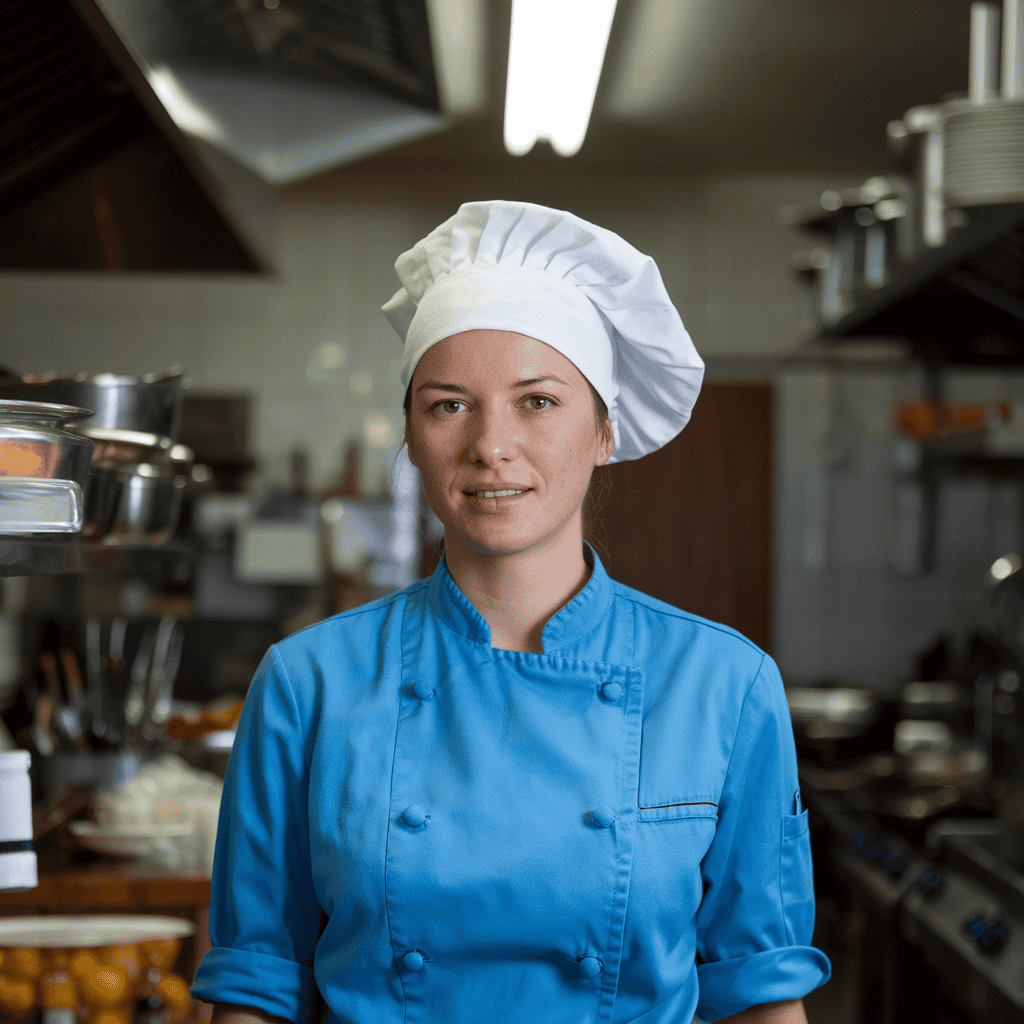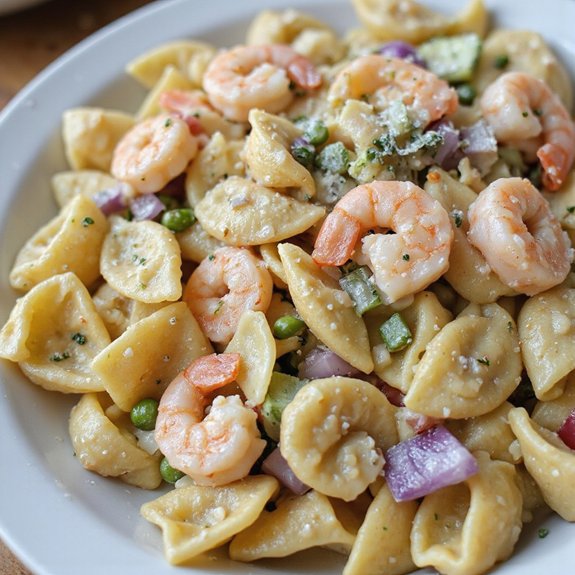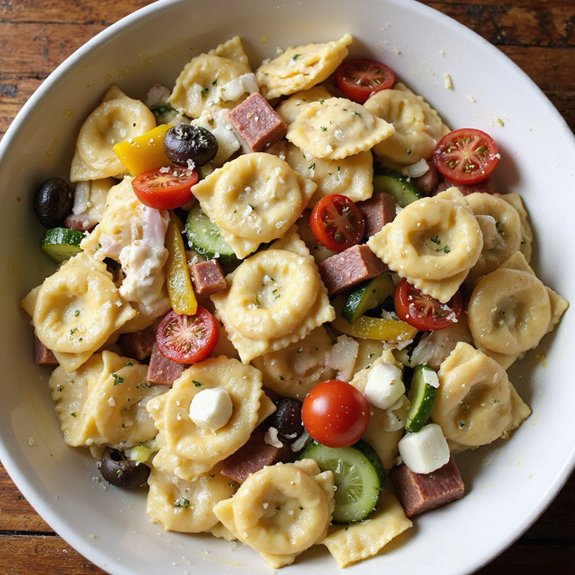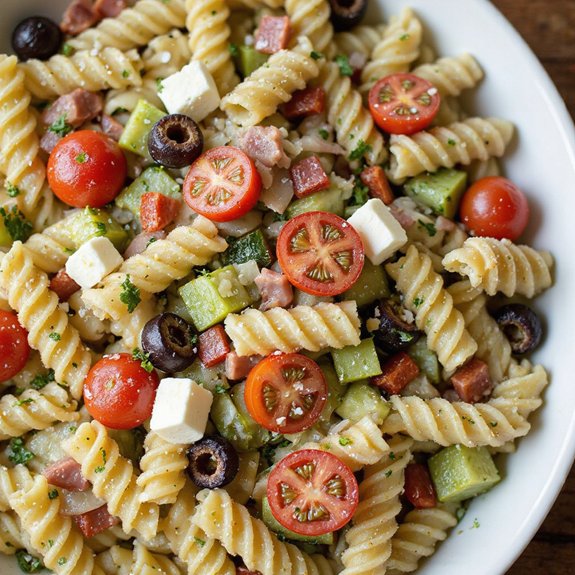Picture the vibrant colors and mouthwatering aromas of fresh Pad Thai sizzling in your kitchen.
There’s something about the perfect blend of sweet, sour, and salty flavors that makes this dish a comforting favorite.
With simple ingredients and a quick prep time, you can effortlessly create this Thai classic.
As the shrimp turn pink and noodles soak up the flavorful sauce, a delightful transformation unfolds. Let’s bring this delightful dish to life!
Kitchen Tools Required
- 1 large skillet
- 1 pot
- 1 spatula
- 1 mixing bowl
- 1 colander
- 1 measuring cup
- 1 cutting board
- 1 knife
Ingredients
- 200 grams rice noodles
- 2 tablespoons vegetable oil
- 200 grams shrimp, peeled and deveined
- 2 cloves garlic, minced
- 1 cup bean sprouts
- 2 eggs, lightly beaten
- 3 tablespoons fish sauce
- 1 tablespoon sugar
- 2 tablespoons tamarind paste
- 1 teaspoon chili powder
- 1/4 cup peanuts, crushed
- 2 green onions, chopped
- 1 lime, cut into wedges
- 1/4 cup fresh cilantro, chopped
Cook & Prep Time
To efficiently manage your time while preparing and cooking Pad Thai, follow this timeline:
- Reading and Preparation (5 minutes)
- Spend a few minutes reading through the entire recipe to familiarize yourself with the steps and ingredients.
- Prep Work (15 minutes)
- Begin by gathering all the ingredients and equipment you’ll need.
- Measure and prepare ingredients as follows:
- Mince 2 cloves of garlic.
- Lightly beat 2 eggs in a small bowl.
- Cut 1 lime into wedges.
- Chop 2 green onions and 1/4 cup of fresh cilantro.
- Crush 1/4 cup of peanuts.
- Prep 200 grams of shrimp by peeling and deveining them if necessary.
- Cooking (20 minutes)
- Cook the rice noodles according to package instructions and drain them using a colander (about 5 minutes).
- Heat 2 tablespoons of vegetable oil in a large skillet over medium heat (1 minute).
- Add the shrimp to the skillet and cook until pink and opaque (about 3 minutes).
- Stir in the minced garlic and cook for another 30 seconds until fragrant.
- Push the shrimp to one side of the skillet and pour the beaten eggs into the empty side.
- Scramble the eggs until fully cooked, then mix them with the shrimp (2 minutes).
- Add the cooked noodles to the skillet and toss everything together (2 minutes).
- In a small bowl, combine 3 tablespoons of fish sauce, 1 tablespoon of sugar, 2 tablespoons of tamarind paste, and 1 teaspoon of chili powder.
- Pour the sauce over the noodle mixture and stir to coat evenly (2 minutes).
- Add 1 cup of bean sprouts, crushed peanuts, and chopped green onions, and toss to combine (2 minutes).
- Resting and Final Touches (5 minutes)
- Let the Pad Thai rest for 5 minutes to allow the flavors to meld.
- During this time, prepare the serving dishes and set the table.
- Garnish with lime wedges and cilantro before serving.
Feel free to adjust the timeline as needed to suit your pace and kitchen setup.
Recipe Instructions
Cook the rice noodles according to package instructions and drain them using a colander.
Heat the vegetable oil in a large skillet over medium heat.
Add the shrimp to the skillet and cook until pink and opaque, about 3 minutes.
Stir in the garlic and cook for another 30 seconds until fragrant.
Push the shrimp to one side of the skillet and pour the beaten eggs into the empty side.
Scramble the eggs until fully cooked, then mix them with the shrimp.
Add the cooked noodles to the skillet and toss everything together.
In a small bowl, combine fish sauce, sugar, tamarind paste, and chili powder.
Pour the sauce over the noodle mixture and stir to coat evenly.
Add the bean sprouts, peanuts, and green onions, and toss to combine.
Let the Pad Thai rest for 5 minutes to allow the flavors to meld.
Garnish with lime wedges and cilantro before serving.
Serving Tips
- Extra Lime Wedges: Offer additional lime wedges on the side to let each guest adjust the tanginess to their liking.
- Chili Flakes: Serve with a side of chili flakes for those who enjoy an extra spicy kick.
- Sliced Cucumber: Add a crisp contrast with fresh cucumber slices, balancing out the dish’s rich flavors.
- Side of Peanut Sauce: Accompany with a small dish of peanut sauce for a creamy, nutty twist to the traditional recipe.
- Steamed Jasmine Rice: Provide a portion of steamed jasmine rice as a neutral base to complement the strong flavors of the Pad Thai.
Storage
To store Pad Thai, let it cool completely.
Then transfer it to an airtight container and refrigerate.
Consume within 3 days.
Reheat gently to preserve texture and flavor.
Avoid freezing.
Freezing
To freeze Pad Thai, let it cool completely.
Then, store it in airtight containers or heavy-duty freezer bags.
Label with the date.
Freeze for up to 3 months for best taste.
Reheating
To reheat Pad Thai, use a skillet over medium heat.
Add a splash of water or oil to prevent dryness.
Stir frequently until heated through for best flavor retention and texture.
Final Thoughts
Making Pad Thai at home can be a rewarding experience.
It’s a delicious dish that combines a variety of flavors and textures.
Ensure you have all the necessary ingredients and equipment ready before you begin.
The key to a perfect Pad Thai lies in balancing the sweet, sour, and salty elements.
Don’t be afraid to adjust the seasoning to suit your taste preferences.
For a touch of tanginess, consider adding a splash of lime juice.
Remember, using fresh ingredients will enhance the overall flavor of your Pad Thai.
Enjoy your homemade Thai cuisine!
Frequently Asked Questions
Can Pad Thai Be Made Vegetarian or Vegan?
You can easily make Pad Thai vegetarian or vegan by substituting tofu for shrimp, using soy sauce instead of fish sauce, and omitting eggs. Make certain you balance flavors with tamarind paste, sugar, and chili for authenticity.
What Are Common Substitutes for Tamarind Paste?
You can substitute tamarind paste with equal parts lime juice and brown sugar for a balanced acidity and sweetness. Alternatively, mix Worcestershire sauce with vinegar for depth. Always adjust proportions to maintain the desired flavor profile.
How Can I Make the Dish Less Spicy?
To make the dish less spicy, reduce the chili powder to half or omit it entirely. You can also add extra sugar or a splash of coconut milk to balance and mellow the heat.
What Is the Origin of Pad Thai?
You’re curious about Pad Thai’s origin. It’s a quintessential Thai street food with roots in 1930s Thailand, promoted as a national dish to boost nationalism. Its flavorful fusion highlights Thai culinary techniques and diverse ingredient balance.
Can I Use Chicken Instead of Shrimp?
Yes, you can substitute chicken for shrimp in Pad Thai. Slice thinly and cook thoroughly until no longer pink. Adjust the cooking time slightly, ensuring chicken is fully cooked. This modification maintains the dish’s balance and texture.
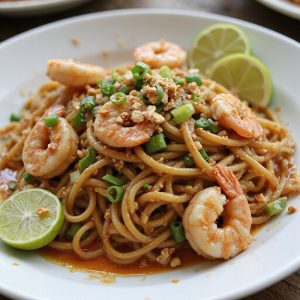
Pad Thai
Equipment
- 1 large skillet
- 1 pot
- 1 Spatula
- 1 Mixing bowl
- 1 colander
- 1 measuring cup
- 1 Cutting board
- 1 Knife
Ingredients
- 200 grams rice noodles
- 2 tablespoons vegetable oil
- 200 grams shrimp peeled and deveined
- 2 cloves garlic minced
- 1 cup bean sprouts
- 2 eggs lightly beaten
- 3 tablespoons fish sauce
- 1 tablespoon sugar
- 2 tablespoons tamarind paste
- 1 teaspoon chili powder
- 1/4 cup peanuts crushed
- 2 green onions chopped
- 1 lime cut into wedges
- 1/4 cup fresh cilantro chopped
Instructions
- Cook the rice noodles according to package instructions and drain them using a colander.
- Heat the vegetable oil in a large skillet over medium heat.
- Add the shrimp to the skillet and cook until pink and opaque, about 3 minutes.
- Stir in the garlic and cook for another 30 seconds until fragrant.
- Push the shrimp to one side of the skillet and pour the beaten eggs into the empty side.
- Scramble the eggs until fully cooked, then mix them with the shrimp.
- Add the cooked noodles to the skillet and toss everything together.
- In a small bowl, combine fish sauce, sugar, tamarind paste, and chili powder.
- Pour the sauce over the noodle mixture and stir to coat evenly.
- Add the bean sprouts, peanuts, and green onions, and toss to combine.
- Let the Pad Thai rest for 5 minutes to allow the flavors to meld.
- Garnish with lime wedges and cilantro before serving.

